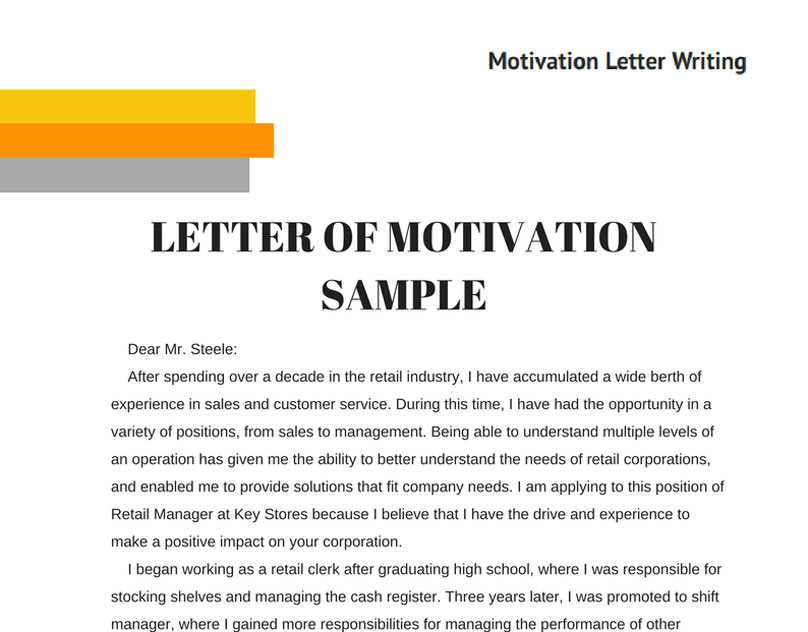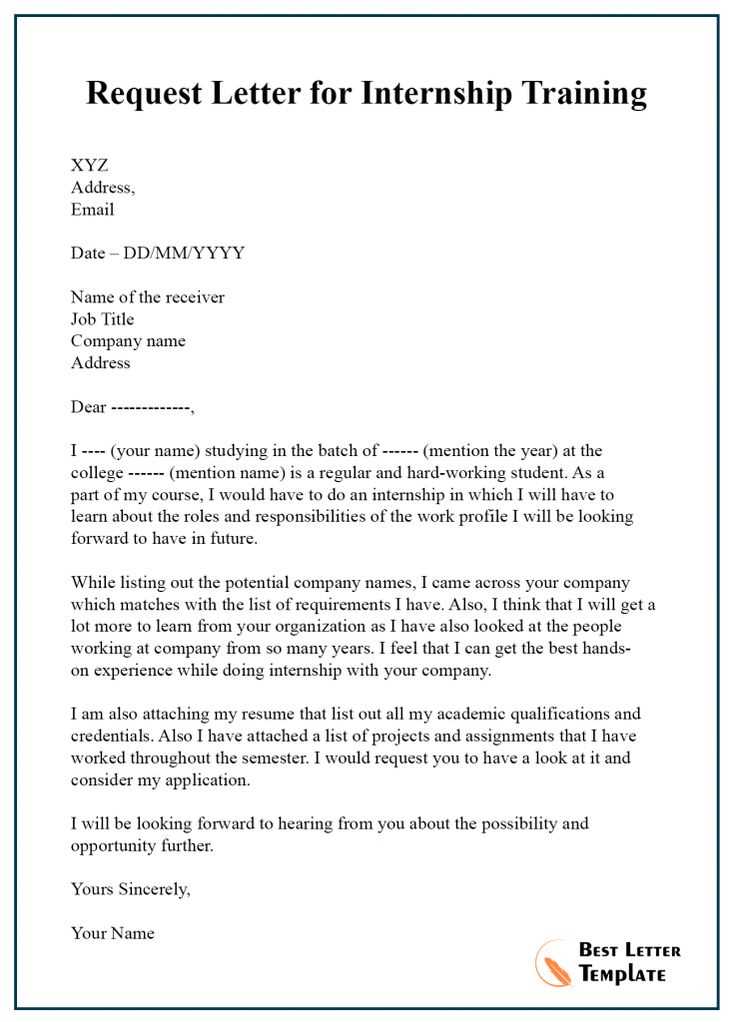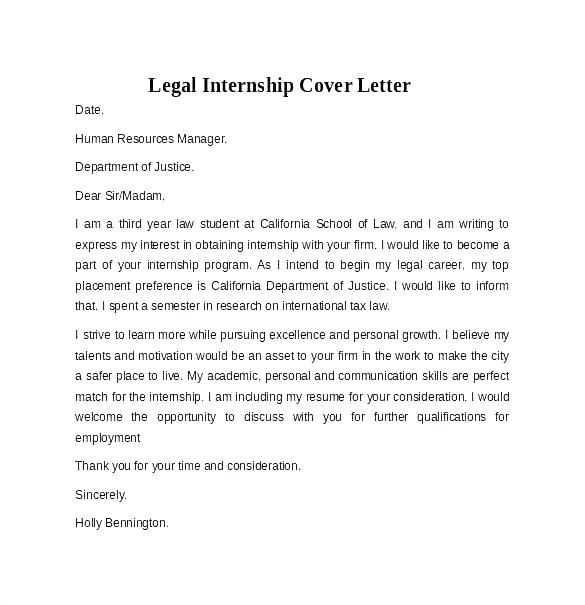Motivational letter for internship template

To stand out in a competitive internship application, your motivational letter needs to demonstrate a clear understanding of both the opportunity and how your skills align with it. Make sure to keep the tone positive and confident, highlighting what you can offer and why you’re eager to contribute to the company’s goals. Show genuine interest in the work they do and how the position fits into your career path.
Start by addressing your specific motivations. Don’t just mention your desire to gain experience, but articulate how the internship aligns with your long-term professional objectives. Explain why the company’s mission excites you and how it reflects your personal values. Focus on concrete examples from your academic work, projects, or volunteer activities to support your claims.
Next, focus on your unique qualities that make you a strong candidate. Instead of listing generic skills, provide examples of how you’ve successfully applied them in real situations. Mention relevant coursework, specific tools, or software you’ve worked with, and how this experience will allow you to make an immediate impact. Show that you’re proactive and willing to learn new skills that will help the team succeed.
Conclude by reiterating your enthusiasm and readiness to contribute. Keep the ending positive and forward-looking, expressing your interest in discussing the opportunity further. Use a professional closing and leave a lasting impression of eagerness and preparedness.
Motivational Letter for Internship Template
Begin with a clear and concise introduction that states your interest in the internship position. Mention the specific role you are applying for and how it aligns with your career goals. Make sure to highlight what excites you about this opportunity, based on the company or industry’s reputation, values, or projects.
Example Introduction:
Dear [Hiring Manager’s Name],
I am writing to express my strong interest in the [Position] internship at [Company Name]. As a [major/field of study] student at [University], I am eager to apply my academic knowledge and gain hands-on experience in [specific field or industry]. I admire [Company Name]’s commitment to [specific value or project] and believe this internship will help me grow professionally while contributing to your team’s success.
Body of the Letter
In the next section, clearly outline your skills and experiences that make you a suitable candidate for the role. Refer to specific coursework, projects, or previous work experiences that directly relate to the responsibilities of the internship. Focus on the skills that would be valuable to the company and explain how you have demonstrated these abilities in the past.
- Skills: Highlight relevant skills such as communication, teamwork, problem-solving, or technical knowledge.
- Experience: Mention any relevant internships, part-time work, or academic projects.
- Achievements: Include any notable accomplishments that showcase your qualifications.
Example Body:
During my time at [University], I completed courses in [specific course or subject], which provided me with a solid foundation in [relevant skill]. I also worked on a project where I [describe a relevant task or achievement], which helped me develop [specific skill]. Additionally, my role as [position] in [organization or club] gave me the chance to hone my teamwork and leadership skills, which I believe will be valuable in this internship.
Closing the Letter

Conclude by expressing enthusiasm for the opportunity and a strong desire to contribute to the team. Mention that you would appreciate the chance to discuss how your skills can benefit the company. Make sure to thank the reader for their time and consideration.
Example Closing:
I am excited about the possibility of contributing to [Company Name] and further developing my skills in [specific field]. I would be happy to discuss how my experiences align with your team’s needs in more detail. Thank you for considering my application, and I look forward to the opportunity to speak with you soon.
Sincerely,
[Your Name]
How to Tailor Your Letter to the Specific Internship
Focus on the company’s needs and the specific role when crafting your letter. Begin by reviewing the job description closely and identify key responsibilities and skills. Address how your experiences align with the tasks mentioned in the listing. Use clear examples from your background that demonstrate relevant skills or projects.
Next, research the company’s values and culture. Customize your letter to show that you understand their mission and how you can contribute. Mention specific aspects of the company that excite you, whether it’s their work in a particular field, recent achievements, or initiatives that resonate with your personal values.
Be specific about what you can offer. Instead of generic statements, provide concrete evidence of how your skills fit the internship’s needs. For instance, if the internship requires teamwork, share an example of a time when you worked well in a group and achieved a common goal.
Lastly, highlight how this opportunity fits with your career goals. Make it clear that this internship is not just a stepping stone, but a chance to grow in the specific area the company focuses on. Showing that you are eager to learn and make an impact will demonstrate genuine interest.
How to Highlight Relevant Skills and Experience for an Internship
Focus on showcasing your experience with practical examples. Start by aligning your past roles, projects, or coursework with the responsibilities listed in the internship description. If you’ve worked on a similar task, make sure to explain the context, your approach, and the results. Use numbers to quantify achievements when possible.
When listing skills, prioritize those that directly match the internship requirements. For instance, if the position demands proficiency in a certain software, mention any hands-on experience you have with it. Don’t just state you know the tool–describe how you used it to complete a project or solve a problem.
Include transferable skills such as teamwork, communication, and problem-solving, but avoid generic descriptions. Instead, provide concrete examples of how you demonstrated these skills in past experiences. Were you part of a group that successfully completed a project on time? Did you have to adapt quickly to a new process? These specifics make your skills stand out.
| Skill | Example |
|---|---|
| Teamwork | Collaborated with a group of five to create a marketing campaign for a local event, resulting in a 25% increase in attendance. |
| Problem-Solving | Identified a recurring issue in the database and developed a solution that reduced errors by 30%. |
| Communication | Managed client communications and provided regular updates, which strengthened relationships and increased project trust. |
Finally, include any relevant certifications or courses that demonstrate your dedication to learning and self-improvement. Even if the experience isn’t directly related, showing your initiative to stay updated in the field can make a positive impression.
Why You Should Show Passion for the Industry in Your Letter
Demonstrating enthusiasm for the field directly aligns you with the values and mission of the company. Employers seek candidates who understand and connect with their work, making passion a key factor in standing out. Passionate applicants convey dedication, which is more likely to result in long-term engagement and success in the role.
When you share your excitement about the industry, you show that you’re not just seeking any job, but a role where you can thrive. This helps recruiters see that you will be invested in your growth within the company. Passion for your chosen field also highlights your knowledge and understanding of its challenges and opportunities.
A genuine interest in the industry makes your application more memorable. It signals that you are proactive and motivated, not just filling out an application. Hiring managers appreciate candidates who actively follow trends, innovations, and changes, and a passionate letter reflects this awareness and commitment to staying current.
Expressing passion also sets the tone for your future interactions with the team. If you show excitement in your letter, it’s likely to be reflected in your attitude once you begin the internship. This energy is contagious and can positively impact team dynamics, helping you to build relationships more easily.
How to Demonstrate Your Ability to Contribute to the Company
Highlight specific skills or experiences that directly align with the company’s current needs. If you have prior experience in similar projects, explain how it can be applied to support their goals. For example, if they are expanding their marketing efforts, share how you successfully executed a campaign or improved social media engagement in the past.
Show a proactive approach by mentioning any initiatives you’ve taken in previous roles. Illustrate how you identified areas for improvement and implemented solutions. This demonstrates your ability to recognize challenges and take action without waiting for direction.
Reference any relevant tools or software you are proficient in, especially if they match the tools the company uses. Being able to hit the ground running can be a significant asset. Explain how your technical abilities can streamline processes or increase productivity.
Provide examples of your teamwork and communication skills. Companies value employees who work well within teams and can collaborate across departments. Share examples where you’ve helped resolve conflicts, facilitated discussions, or contributed to group efforts that resulted in success.
Lastly, express your eagerness to learn and grow within the company. Show that you’re not only bringing value but also committed to continuous improvement. This willingness to adapt to new challenges is something companies look for in potential interns.
Best Closing Strategies to Leave a Strong Impression

Be concise and specific when wrapping up your letter. A clear call to action will guide the reader to the next steps. Mention your enthusiasm to contribute and express your readiness for further communication, such as an interview or follow-up conversation. This shows initiative and eagerness without being overly pushy.
Tailor your closing sentence to the company or organization’s values. Referencing their goals or recent projects briefly demonstrates your knowledge and interest. This can spark a connection between you and the team, making your letter more memorable.
Use a polite and confident sign-off. Phrases like “I look forward to the opportunity to discuss my application further” keep the tone friendly and professional. Avoid generic closings; instead, personalize them to fit the message and tone you’ve set throughout your letter.
End by thanking the reader for their time and consideration. This leaves the impression that you are respectful and mindful of their schedule, reinforcing your professional demeanor.